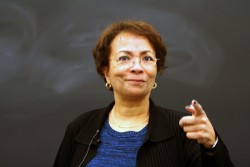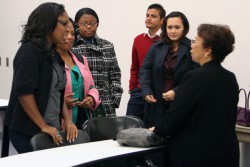 Taunya Banks delivers a lecture on Thurgood Marshall. |
Taunya Lovell Banks of the University of Maryland School of Law recently spoke about Supreme Court Justice Thurgood Marshall to a packed crowd at Drake University Law School.
More than 100 students, including a group of seven from the University of South Dakota School of Law, gathered to hear Banks, the Jacob A. France professor of equality jurisprudence.
Banks argued that Marshall strongly supported racial discrimination plaintiffs, but “was a bit more limited in his support for female parties in some noteworthy cases,” said Mark Kende, the James Madison Chair in Constitutional Law at Drake.
“Perhaps this reflected the period in which he lived,” said Kende, who serves as director of Drake’s Constitutional Law Center.
 Taunya Banks interacts with law students from South Dakota Law School. |
Banks, who also serves as the Harriet Iglehart research professor of law, said that Marshall had a comparatively large number of women law clerks and had an overall favorable record for women’s rights. In the end, however, race was his major concern, she said.
Banks’ research interests span a range of socio-legal topics that explore the interplay of race, gender, class and popular culture in the creation and application of law and social policy.
She has published articles in numerous law journals, including the Harvard Civil Rights – Civil Liberties Law Review, UCLA Law Review, New York University Review of Law and Social Change and Michigan Law Review.
Her talk, “Thurgood Marshall on the Bench: ‘Race Man’ and ‘Pragmatic Feminist,'” was part of Drake’s Constitutional Law Distinguished Lecture series.
The series will continue on Thursday, March 25, 2010. Michael C. Dorf, the Robert S. Stevens professor of law at Cornell Law School, will give the next talk on “Same Sex Marriage, Labels, and Social Meaning.” The discussion will begin at 3 p.m., room 213 in Cartwright Hall.

